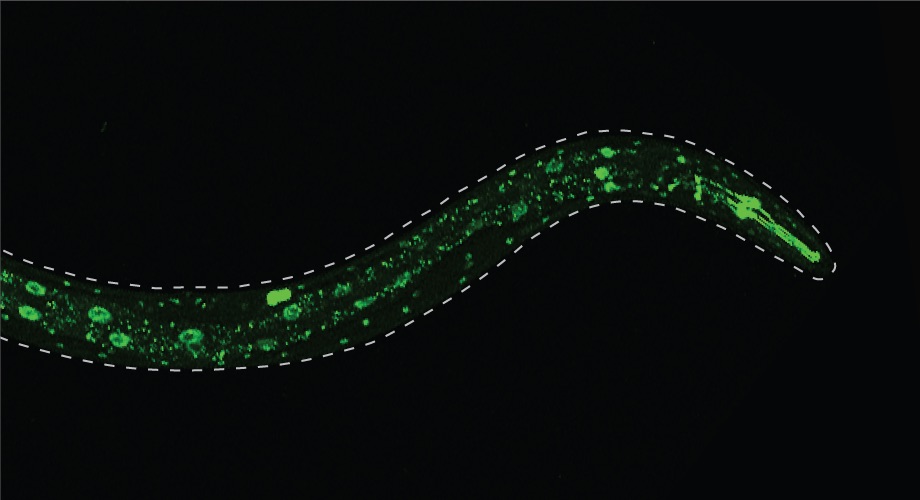
A new study conducted in roundworms reveals that specific genes are turned on to protect cells' inner machinery from becoming over-stressed during times of prolonged fat-burning. (Image courtesy of the Srinivasan laboratory at Scripps Research.)
Feedback loop within intestinal cells may explain why prolonged fat-burning doesn’t diminish longevity
In studies involving roundworms, Scripps Research scientists discover a cellular process that may hold implications for treating metabolic diseases.
October 20, 2020
LA JOLLA, CA—A critical gap in longevity research caught the attention of Scripps Research neuroscientist Supriya Srinivasan, PhD, several years ago. She noticed that while many studies pointed to significant health benefits—including longer lifespan—from sustained fat-burning, nearly all of those studies were in the context of a disease such as diabetes or obesity.
“Very few studies have investigated what happens if you sustain fat oxidation in a normal, healthy organism,” says Srinivasan, whose lab focuses on how the nervous system affects metabolism. “Is this higher rate of metabolic activity beneficial over a long period of time if you don’t have a condition that requires fat loss?”
It’s an important question to answer, especially since a large body of research offers evidence that lifespan is enhanced by decreased metabolic activity, usually from long-term calorie restriction.
in a new study published in the journal eLife, Srinivasan brings new clarity to her field by uncovering a previously unknown communication loop within cells lining the intestines—a loop that’s activated only in times of prolonged fat-burning to protect longevity. Without this mechanism, sustained fat loss would trigger a damaging stress response in cells and reduce lifespan.
Though the study didn’t specifically look at fat-burning ketogenic diets, the findings may be of interest to the ketogenic community because it evaluated physiological effects similar to those induced by the diet.
Srinivasan’s experiments involved tiny roundworms known as C. elegans. Much of worm’s genome is conserved in humans—including genes that control metabolism, the gut and the nervous system—making it an ideal animal for longevity studies. And due to the organism’s small size, it’s possible to perform genetic screening experiments quickly and precisely, keying in on individual genes and their functions.
For this work, Srinivasan built upon prior studies that established a communication pathway between the brain and cells lining the intestine—the major seat of metabolic and longevity regulation. In response to information from the environment, neurons secrete a peptide called FLP-7 that activates a receptor in intestinal cells to drive fat loss.
In her new research, Srinivasan found that when fat loss continues for an extended period, a new process is activated within those cells. “We discovered a feedback loop between the enzyme that triggers the breakdown of stored fat droplets and the mitochondria, which are the engines within cells that convert fats to energy,” she says.
Through these intracellular conversations, specific genes are turned on to protect the mitochondria from becoming over-stressed. At the center of this “feedback loop” is a type of protein known as a transcription factor that can tune gene expression depending on what is happening in the body.
The study found that transcription factor HLH-11 is controlling these processes during prolonged fat loss, coordinating the balance between burning fats and protecting longevity. Without HLH-11, mitochondrial stress went uncontrolled, reducing lifespan in the worms.
Srinivasan plans to advance her research through additional experiments, with the goal of working towards new medical interventions for metabolic diseases.
Authors of the study, “A Feedback Loop Governs the Relationship Between Lipid Metabolism and Longevity,” include Nicole K. Littlejohn, Nicolas Seban, Chung-Chih Liu and Supriya Srinivasan.
Funding for the study was provided by the National Institute of Diabetes and Digestive and Kidney Diseases [DK095804], the National Institute on Aging [AG056648], and the American Heart Association [17POST33660740].
For more information, contact press@scripps.edu

